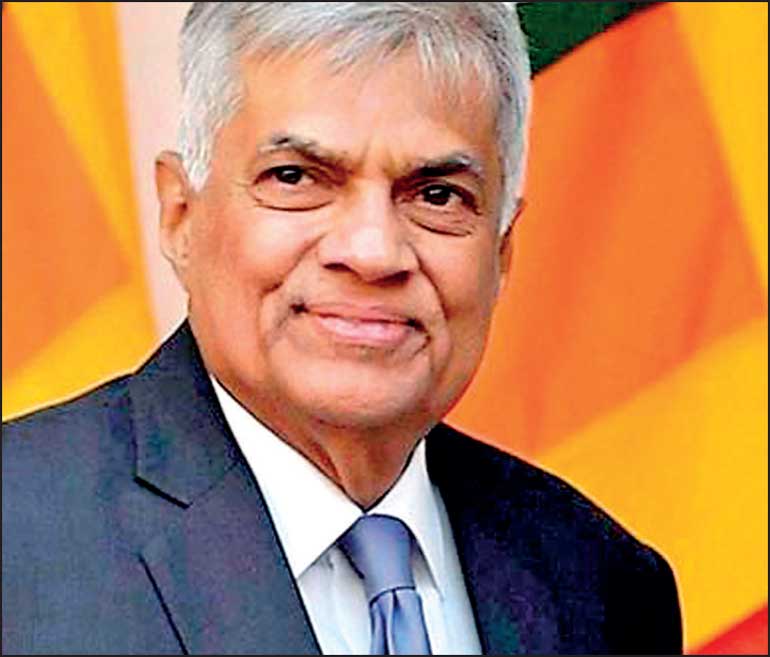Monday Feb 16, 2026
Monday Feb 16, 2026
Friday, 30 September 2022 00:00 - - {{hitsCtrl.values.hits}}

President Ranil Wickremesinghe
 The picture of Sri Lanka is still not clear; it is in a state of chaos. Apparently the most difficult phase of the balance of payments crisis is moving towards a point where it could be resolved for the common good of the country; but the most difficult era of this crisis will not end with that phase. Even if Sri Lanka succeeds in receiving the IMF relief package, the explosive economic and other reforms that the IMF wants introduced to be qualified for that could be implemented effectively only if it succeeds in reaching a general national consensus for it.
The picture of Sri Lanka is still not clear; it is in a state of chaos. Apparently the most difficult phase of the balance of payments crisis is moving towards a point where it could be resolved for the common good of the country; but the most difficult era of this crisis will not end with that phase. Even if Sri Lanka succeeds in receiving the IMF relief package, the explosive economic and other reforms that the IMF wants introduced to be qualified for that could be implemented effectively only if it succeeds in reaching a general national consensus for it.
However, the severity of the failure and the state of bankruptcy that Sri Lanka has encountered at the moment has not led to create a favourable atmosphere where the overwhelming cupidity of political leaders for power is mitigated and everyone is united to extend their unstinted support towards rescuing Sri Lanka out of the abyss it has fallen into. Under the circumstances, creating unity among political parties to overcome the crisis can be considered as a distant dream that is not easy to achieve.
Greed for power and power struggle
The present crisis led to the ascension of Ranil Wickremesinghe, who had only one seat in Parliament, to the post of Prime Minister and then to the position of President. It can be considered a miracle in the political sense. Yet, he who had been elected president in that way did not have a parliamentary group. Despite the fact that he may have had various limitations, he can be considered as the most qualified person to be chosen from among the current politicians to solve the difficult crisis that Sri Lanka is facing at the moment, which is unique and complex. He is endowed with necessary knowledge, experience, and ability to make decisions and to get international support. Taking all these aspects and the seriousness of the crisis into account, the Opposition should have followed a policy of supporting the program implemented by the president, at least for a limited period (probably one and a half to two years). Initially, there was a great deal of agreement for that among the members of the party led by the leader of the Opposition.
But, the leader of the Opposition seems to have perceived it as something that would destroy his party along with him. Therefore, he has adopted a policy that prevented the emergence of such an alliance. In the end, to achieve that goal, he joined hands with the Peratugami Party (The Frontline Socialist Party) and launched street agitations and demonstrations thereby making his party an important partner of the program to send Ranil home.
With that, the prospect of the opposition entering into a united course of action to overcome the crisis was thwarted. It seems that the political strategy of the leader of the opposition is to politically destroy President Ranil Wickremesinghe, his main political rival by making him a political prisoner dependent on the Pohottuwa party. The outcome of such a strategy in the current political context could have a devastating impact not only on Ranil , but also on the leader of the opposition and his party, and above all, on the country as well.
The policy of the leader of opposition reminded me of the policy followed by Sirima Bandaranaike in the early stage of the second insurrection of the JVP and the price the country had to pay for it.
The second insurrection of the JVP
The JVP interpreted the Indo-Lanka agreement as an Indian invasion, and it launched a terrible and violent struggle in the guise of a patriotic war against it and to capture the political power of the country. In that struggle, JVP described J.R. Jayewardene as a traitor who had betrayed the country to India. The slogan -“Kill JR” was a harsh phrase used by the JVP for their wall posters. The protest of the JVP displayed against J.R. and the Indo-Lanka Agreement fitted well with the political thoughts and aspirations of Sirima Bandaranaike as well.
Consequently, she followed a policy of assisting the JVP informally at the first phase of the insurrection. On the eve of the 1988 presidential election, she even went to the extent of working in close cooperation with the JVP to nominate a common candidate for the presidential election. However, when she realised that the strategic aim of that program of the JVP was to keep her out from contesting the presidential election with surreptitious intention of advancing the insurrection, she decided to contest the presidential election defying the threats from the JVP. But, the SLFP was in a very weak condition at the time of the presidential election since a large group of party members had joined the insurrection following her example when she was in alliance with the JVP. Because of that, she was defeated in the presidential election which she could have won. Consequently, the UNP rule which could have been ended in 1988 restricting it for two terms got extended to a third consecutive term. The rebels had a hatred for J.R. but they did not have such a feeling for Premadasa; they rather loved him. The JVP’s assessment was that if Sirimavo could be prevented from coming to power, it would be easy for them to defeat Premadasa after the presidential election. Proving their belief wrong, President Premadasa defeated the JVP insurrection.
What could be the end?
If the Opposition adopts a policy of not supporting or rather blocking, directly or indirectly, the implementation of reforms necessary for resolving the balance of payments crisis, it is inevitable that Sri Lanka will fall into an abyss even worse than the one it had fallen into before. Most probably, such a situation could turn out to be a detrimental factor that will cause great destruction not only to President Ranil and his government, but also to the leader of the Opposition and his party as well, and above all, the country in general. The survival and security of the country is more important than anything else.
On this special occasion, it is important that the leaders who organise demonstrations and agitations aimed at ousting the Government should have a relook at them. The Constitution of Sri Lanka is designed in such a manner that the government in power cannot be overthrown by such actions. The damage caused by such actions to the object of resolving the balance of payments crisis when efforts are being made to resolve it, is huge.
How to formulate a framework to solve the balance of payments crisis and socio-political crisis that all political parties and young activists of the Aragalaya could accept and work together can be considered as the biggest political problem that Sri Lanka needs to solve at the moment. In this process, a general consensus can be reached through negotiation to allow an early election and implementation of a two-phase reform program as was done in South Africa.
In the first phase, a general consensus can be reached for a reform program that will lead to a positive and profound change in the system, including the formulation of a participatory constitution and appointing an all-party governing body to implement the program. By adopting an interim constitution, the entire work plan of the reform program can be turned into a process that flows to a logical conclusion with a statutory foundation.
The United Nations may be assigned the responsibility to act as an observer of the reform program. Shouldn’t the Government as well as the Opposition contemplate on such a program? Shouldn’t the international community, including India and Japan, force the political leaders of Sri Lanka to embark on such a program?